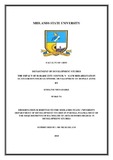Please use this identifier to cite or link to this item:
https://cris.library.msu.ac.zw//handle/11408/3393| Title: | The impact of Harare city council’s slum rehabilitation activities on socio-economic development of Hopley zone | Authors: | Musabaike, Emeline | Keywords: | Rural-urban migration Unemployment Urbanisation Poverty |
Issue Date: | 2018 | Publisher: | Midlands State University | Abstract: | The research analyses the major causes and proliferation of Hopley slum settlement in the capital city of Harare. It is discussed that slum settlement in the capital is subjected to various factors such as government policies, rural-urban migration, unemployment, rapid urbanisation, poverty and other discussed factors. Challenges associated in Hopley slum settlement have direct impact on the environment and on human lives as highlighted in the research, such as shortage of space, destruction of flora and fauna, land degradation, rapid spread of diseases and loss of lives. The adopted measures in addressing Hopley Zone settlement by Harare City Council together with other stakeholders, encompasses the role played by the Council in Operation Garikai/Hlalani Kuhle, implementation of the Bottom-up Approach, development projects undertaken under Public Private Partnerships, introduction of low costing housing schemes, developments through Aided Self-Help Method, the Internal-External development model, the Incremental Approach and the introduction of housing co-operatives, regularization in slum settlement and undertaking partnerships with Non-Governmental Organizations. Thus, the successes of the rehabilitation intervention comprises of public private partnerships, the external assistance, housing paying schemes and the introduction of housing cooperatives. On the other hand, the challenges consist of financial challenges, a poor legal framework, political factors and the economic meltdown, corruption, lack of government grants, lack of donor funding, marginalization of slum dwellers, lack of security systems in the settlement, the shortfalls of the top bottom approach among others largely contributed to the failure of slum upgrading interventions by Harare City Council in Hopley settlement.Recommendations drawn from the study advocates for the effective and efficient stakeholder involvement, encourage reconciliation in communities for progress, communication between Council and the local people, encourage local economic development and the policy to improve provision of basic services to urban poor community. | URI: | http://hdl.handle.net/11408/3393 |
| Appears in Collections: | Bachelor Of Arts In Development Studies Honours Degree |
Files in This Item:
| File | Description | Size | Format | |
|---|---|---|---|---|
| EMELINE MUSABAIKE EDITED.pdf | Full Text | 717.88 kB | Adobe PDF |  View/Open |
Page view(s)
186
checked on Feb 26, 2025
Download(s)
480
checked on Feb 26, 2025
Google ScholarTM
Check
Items in MSUIR are protected by copyright, with all rights reserved, unless otherwise indicated.


